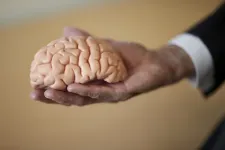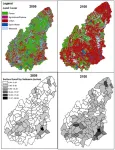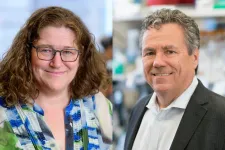(Press-News.org) Could changing your diet play a role in slowing or even preventing the development of dementia? We’re one step closer to finding out, thanks to a new UNLV study that bolsters the long-suspected link between gut health and Alzheimer’s disease.
The analysis — led by a team of researchers with the Nevada Institute of Personalized Medicine (NIPM) at UNLV and published this spring in the Nature journal Scientific Reports — examined data from dozens of past studies into the belly-brain connection. The results? There’s a strong link between particular kinds of gut bacteria and Alzheimer’s disease.
Between 500 and 1,000 species of bacteria exist in the human gut at any one time, and the amount and diversity of these microorganisms can be influenced by genetics and diet.
The UNLV team’s analysis found a significant correlation between 10 specific types of gut bacteria and the likelihood of developing Alzheimer’s disease. Six categories of bacteria — Adlercreutzia, Eubacterium nodatum group, Eisenbergiella, Eubacterium fissicatena group, Gordonibacter, and Prevotella9 — were identified as protective, and four types of bacteria — Collinsella, Bacteroides, Lachnospira, and Veillonella — were identified as a risk factor for Alzheimer’s disease.
Certain bacteria in humans’ guts can secrete acids and toxins that thin and seep through the intestinal lining, interact with the APOE (a gene identified as a major risk factor for Alzheimer’s disease), and trigger a neuroinflammatory response — affecting brain health and numerous immune functions, and potentially promoting development of the neurodegenerative disorder.
Researchers said their novel discovery of the distinct bacterial groups associated with Alzheimer’s disease provides new insights into the relationship between gut microbiota and the world’s most common form of dementia. The findings also advance scientists’ understanding of how an imbalance of that bacteria may play a role in the disorder’s development.
“Most of the microorganisms in our intestines are considered good bacteria that promote health, but an imbalance of those bacteria can be toxic to a person’s immune system and linked to various diseases, such as depression, heart disease, cancer, and Alzheimer’s disease,” said UNLV research professor Jingchun Chen. “The take-home message here is that your genes not only determine whether you have a risk for a disease, but they can also influence the abundance of bacteria in your gut.”
While their analysis established overarching categories of bacteria typically associated with Alzheimer’s disease, the UNLV team said further research is needed to drill down into the specific bacterial species that influence risk or protection.
The hope is to one day develop treatments that are customized for an individual patient and their genetic makeup, such as medications or lifestyle change. Studies have shown that changes in gut microbiome through probiotic use and dietary adjustments can positively impact the immune system, inflammation, and even brain function.
“With more research it would be possible to identify a genetic trajectory that could point to a gut microbiome that would be more or less prone to developing diseases such as Alzheimer’s,” said study lead author and UNLV graduate student Davis Cammann, “but we also have to remember that the gut biome is influenced by many factors including lifestyle and diet.”
Publication Details
“Genetic correlations between Alzheimer’s disease and gut microbiome genera” was published this spring in Scientific Reports.
In addition to faculty, undergraduate, and graduate student researchers from NIPM, scientists from the UNLV College of Sciences, UNLV School of Dental Medicine, UNLV School of Integrated Health Sciences’ Department of Brain Health, Kirk Kerkorian School of Medicine at UNLV, Columbia University, and University of Texas Health Science Center at Houston contributed to the study.
END
Brain-belly connection: gut health may influence likelihood of developing Alzheimer’s
UNLV study pinpoints 10 bacterial groups associated with Alzheimer’s disease, provides new insights into the relationship between gut makeup and dementia
2023-05-11
ELSE PRESS RELEASES FROM THIS DATE:
New research from UMass Amherst links changes in land use to water quality and quantity
2023-05-11
AMHERST, Mass. – Researchers at the University of Massachusetts Amherst recently published a study in the journal PLOS Water that focuses on the Sudbury-Assabet and Concord watershed in eastern Massachusetts, and which links hydrological changes, including floods, drought and runoff, to changing patterns of land use.
“We all live in a watershed” says Timothy Randhir, professor of environmental conservation at UMass Amherst and the paper’s senior author. “We’re constantly modifying our landscape, turning what were once forests into ...
UC Irvine study shows traffic-related air pollution in Irvine weakens brain function
2023-05-11
Irvine, Calif., May 11, 2023 – Researchers from the University of California, Irvine have found that exposure to traffic-related air pollution in Irvine led to memory loss and cognitive decline and triggered neurological pathways associated with the onset of Alzheimer’s disease.
“The link between air pollution and Alzheimer’s disease is concerning, as the prevalence of toxicants in ambient air is not just on the rise globally, but also hitting close to home here in Irvine,” said corresponding ...
Bail reform law in New York had negligible effect on increases in crime
2023-05-11
Across the United States, legislators and the public have debated the issue of bail reform, which aims to reduce pretrial jail populations by eliminating cash bail. New York State passed legislation in 2019 to limit the use of money bail and expand pretrial release. In a new study, researchers evaluated the effect of the law on state crime rates, considering the effect of the COVID-19 pandemic. Although rates of murder, larceny, and motor vehicle theft rose after the bail reform law went into effect, none of the increases were statistically significant when compared with a control group. This suggests that the effect of bail reform on crime rate increases was negligible.
The study, ...
The science of attraction: why do we fall for certain people?
2023-05-11
Sometimes life’s most meaningful relationships grow from the briefest of connections. Like when you go to a party and meet someone wearing your favorite band’s T-shirt, or who laughs at the same jokes as you, or who grabs that unpopular snack you alone (or so you thought) love. One small, shared interest sparks a conversation—that’s my favorite, too!—and blossoms into lasting affection.
This is called the similarity-attraction effect: we generally like people who are like us. Now, new findings from a Boston ...
Estimated annual spending on Lecanemab and its ancillary costs in the Medicare program
2023-05-11
About The Study: Lecanemab and associated ancillary services could add an estimated $2 billion to $5 billion annually to Medicare spending with substantial out-of-pocket costs for beneficiaries lacking supplemental coverage, according to a cost analysis using nationally representative survey data. Lecanemab, an antidementia medication with modest clinical benefit, received accelerated Food and Drug Administration approval.
Authors: John N. Mafi, M.D., M.P.H., of the David Geffen School of Medicine at the University of California, Los Angeles, is the corresponding ...
Kentucky, Tennessee GAME Change team wins NSF Engines Development Award
2023-05-11
LEXINGTON, Ky. (May 11, 2023) — The University of Kentucky, as lead organization, together with partners across Kentucky and Tennessee, has been awarded $1 million from the U.S. National Science Foundation’s Regional Innovation Engines, or NSF Engines, program. This team’s proposal, “Advancing carbon centric circular economy technologies for advanced manufacturing solutions (KY, TN),” is led by a coalition named Generate Advanced Manufacturing Excellence for Change (GAME Change).
The GAME Change team is among the more than 40 unique teams to receive one of the first-ever NSF Engines ...
Study could help solve mystery of the disappearing twins
2023-05-11
Key takeaways
UCLA and Keck Observatory scientists analyzed over a decade’s worth of data about 16 young supermassive stars orbiting the supermassive black hole at the center of the Milky Way galaxy.
Supermassive stars typically are formed in pairs, but the new study found that all 16 of the stars were singletons.
The findings support a scenario in which the supermassive black hole drives nearby stars to either merge or be disrupted, with one of the pair being ejected from the system.
When supermassive stars are born, they’re almost always paired ...
Expansion of cell-to-cell communication drives the early development of pancreatic cancer, new research in mice finds
2023-05-11
Discussions of cancer often stress the genetic mutations that drive disease by altering the normal function of cellular proteins. KRAS, for example, normally acts as an on/off switch for cellular proliferation, but mutations to the gene — common in lung cancer, colorectal cancer and pancreatic cancer — cause that switch to stay on.
Yet mutations are only half of the story.
Interactions between these genetic mutations and external factors, such as tissue injury that leads to inflammation, reshape both cells’ identities and their local environment in ways that foster cancer’s emergence and runaway growth.
In pancreatic cancer, these changes start ...
When stem cells can’t roll on a bumpy road, muscles break down
2023-05-11
Key takeaways
Stem cells travel along a collagen network to reach damaged muscle tissue and heal it.
In Duchenne muscular dystrophy, stiff, scarred collagen prevents stem cells from reaching their target.
A protein called sarcospan lessens this scarring and allows stem cells to do their job more successfully, pointing toward potential new treatments for the disorder.
Muscles that ache after a hard workout usually don’t hurt for long, thanks to stem cells that rush to the injured site along “collagen highways” within the muscle and repair the damaged tissue. ...
SwRI to lead NASA/SSERVI Center for Lunar Origin and Evolution
2023-05-11
SAN ANTONIO — May 11, 2023 —Southwest Research Institute has entered into a five-year, $7.5-million cooperative agreement with NASA to lead the Center for Lunar Origin and Evolution (CLOE), which will conduct basic research to support science enabled by human exploration of the Moon and the Endurance-A mission concept, a far side lunar rover mission prioritized by the 2022 Planetary Science and Astrobiology Decadal Survey report, “Origins, Worlds, and Life.” CLOE will be part of NASA’s Solar System Exploration Research Virtual Institute (SSERVI).
“The Moon is unmatched in its potential to provide ...
LAST 30 PRESS RELEASES:
ASU researchers to lead AAAS panel on water insecurity in the United States
ASU professor Anne Stone to present at AAAS Conference in Phoenix on ancient origins of modern disease
Proposals for exploring viruses and skin as the next experimental quantum frontiers share US$30,000 science award
ASU researchers showcase scalable tech solutions for older adults living alone with cognitive decline at AAAS 2026
Scientists identify smooth regional trends in fruit fly survival strategies
Antipathy toward snakes? Your parents likely talked you into that at an early age
Sylvester Cancer Tip Sheet for Feb. 2026
Online exposure to medical misinformation concentrated among older adults
Telehealth improves access to genetic services for adult survivors of childhood cancers
Outdated mortality benchmarks risk missing early signs of famine and delay recognizing mass starvation
Newly discovered bacterium converts carbon dioxide into chemicals using electricity
Flipping and reversing mini-proteins could improve disease treatment
Scientists reveal major hidden source of atmospheric nitrogen pollution in fragile lake basin
Biochar emerges as a powerful tool for soil carbon neutrality and climate mitigation
Tiny cell messengers show big promise for safer protein and gene delivery
AMS releases statement regarding the decision to rescind EPA’s 2009 Endangerment Finding
Parents’ alcohol and drug use influences their children’s consumption, research shows
Modular assembly of chiral nitrogen-bridged rings achieved by palladium-catalyzed diastereoselective and enantioselective cascade cyclization reactions
Promoting civic engagement
AMS Science Preview: Hurricane slowdown, school snow days
Deforestation in the Amazon raises the surface temperature by 3 °C during the dry season
Model more accurately maps the impact of frost on corn crops
How did humans develop sharp vision? Lab-grown retinas show likely answer
Sour grapes? Taste, experience of sour foods depends on individual consumer
At AAAS, professor Krystal Tsosie argues the future of science must be Indigenous-led
From the lab to the living room: Decoding Parkinson’s patients movements in the real world
Research advances in porous materials, as highlighted in the 2025 Nobel Prize in Chemistry
Sally C. Morton, executive vice president of ASU Knowledge Enterprise, presents a bold and practical framework for moving research from discovery to real-world impact
Biochemical parameters in patients with diabetic nephropathy versus individuals with diabetes alone, non-diabetic nephropathy, and healthy controls
Muscular strength and mortality in women ages 63 to 99
[Press-News.org] Brain-belly connection: gut health may influence likelihood of developing Alzheimer’sUNLV study pinpoints 10 bacterial groups associated with Alzheimer’s disease, provides new insights into the relationship between gut makeup and dementia





